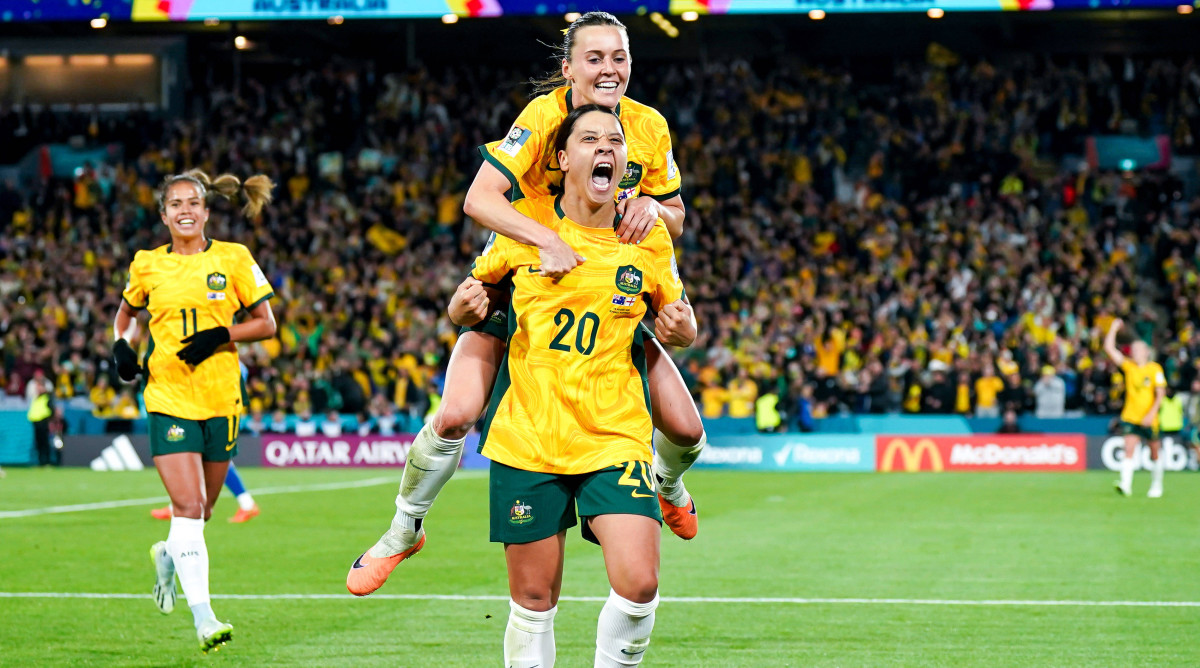The Matildas Forever Changed Soccer in Australia After a Wild Women’s World Cup Run

The curtains have closed on Australia’s dream Women’s World Cup campaign, with the Matildas running into a ruthless England side in Wednesday’s semifinal. Playing in front of a raucous Sydney crowd of more than 75,000 fans, Australia succumbed to a superior Lionesses squad, 3–1, in a more competitive matchup than the score line would suggest. But before “Sweet Caroline” played through the venue’s speakers and Sarina Wiegman’s side rained on Australia’s parade, the Matildas offered their country a parting gift for acting as World Cup cohosts: a Sam Kerr banger.
Down 1–0 in the 63rd minute and the Matildas in desperate need of a sign of life, Kerr, who was making her only 2023 World Cup start, turned on the gas. Dribbling straight at two English defenders, the star striker pulled off a finish perhaps only she could, letting off a rocket from well outside of the box to equalize. The worldie sent the crowd into a frenzy, with thunderous cheers booming from Stadium Australia. Kerr’s goal, despite it ultimately not being consequential to the final result, is an instant classic, immediately becoming one of Australia’s top sporting moments as soon as the ball left the captain’s boot.
While it’s easy to focus on what could’ve been, as the semifinal looked within the Matildas’ grasp at moments, you don’t have to zoom out too far to appreciate the magnitude of Australia’s performance. Tenth in the FIFA rankings heading into the World Cup, few had the hosts advancing deep into the knockout phase. Doubts plagued the team early as it announced Kerr would miss considerable minutes due to a calf injury. Then, the Matildas fell to Nigeria in the group stage, setting up a high-stakes, win-and-advance Group B finale with Canada. Without their star, the Matildas forged ahead, shutting out Canada 4–0 before comfortably handling Denmark 2–0, showing that they are more than just one player. Veterans like Hayley Raso, Mackenzie Arnold, Alanna Kennedy and Caitlin Foord stepped up, while 20-year-old sensation Mary Fowler announced herself on the world stage.
Even with Australia appearing remarkably disciplined under manager Tony Gustavsson, would the hosts really be able to take out soccer giants France in a World Cup quarterfinal? The answer turned out to be yes—and in dramatic fashion. The Matildas kept their composure through a stressful 20-shot PK shootout to punch their tickets to the semifinals, capturing all of Australia’s attention in doing so. According to Australian media company Seven West Media, the thriller drew a peak of more than 7 million viewers—the largest television audience of the year—making it one of the country’s most-watched sporting events in recent history.

It was a wild, fairy-tale ride for the group, and while the journey may have come to a heartbreaking end, Gustavsson’s squad deserves all the credit for not only exceeding expectations on the pitch but also compelling Australia to pay attention and believe. Smashing attendance and viewership records as they became the first Australian team to advance to the World Cup semifinals, this particular Matildas group has cemented its place in footballing history. “It’s obviously the World Cup so there’s more attention, but I think this has been growing, so it’s not unexpected. … The women’s game is finally getting the recognition it deserves,” said Kerr during a World Cup press conference.
Soccer is a global game, but it hasn’t always attracted the eyeballs—or respect—in Australia that it has in other parts of the world, with Australian Rules football and rugby reigning supreme. This World Cup has likely changed that. And with the heightened attention, hopefully, will come increased investment. A necessary first step in advancing the sport domestically is for the A-League, Australia’s top-flight women’s league, to become fully professionalized, allowing players to compete full time—a move the Matildas have repeatedly called for.
When presented with the leaps and bounds they have made, Kerr & Co. are quick to honor those who came before them, but it’s worth mentioning that the Matildas program was in less-than-stellar shape when this generation inherited it. Unable to advance out of the World Cup group stage until 2007, and failing to qualify for the Olympics in ’08 and ’12, Australia wasn’t exactly considered a soccer superpower in the early aughts. Things began to shift relatively quickly, though, (having a singular talent like Kerr donning the country’s crest certainly helped) with the Matildas advancing to the round of 16 in the ’19 World Cup and finishing fourth at the Tokyo Olympics before this summer’s momentous outing.
Not unlike the infamous ’99ers of the U.S. women’s national team, the Matildas have now planted a powerful seed on their home soil, inspiring a new collective of soccer fans and hopefuls. It’s a rare occurrence in sports to watch history as it’s being made or witness a new era unfurl in real time, and that’s just what this Australian team has done. Luckily for them, given the Matildas’ age and form, they just might be able to reap the benefits of what they sowed Down Under, in a year’s time at the Olympics or in four years at the next World Cup. Arguably even more meaningful, though, expect a new wave of Australian players to rule the international stage in the decades to come thanks to what the Matildas did this summer, with their entire country watching.
